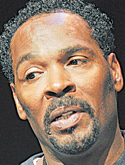

Monday, June 18, 2012

King
By JESSE WASHINGTON
AP National Writer
LOS ANGELES
Twenty years later, Rodney King’s simple yet profound question still lingers, from the street where Trayvon Martin died all the way to the White House:
“Can we all get along?”
Spoken as fires of rage and frustration wrecked Los Angeles, the quote distilled centuries of racial strife into a challenge — and a goal. Today, the various answers to that question measure the lasting significance of King, who died in California on Sunday after he was found at the bottom of his swimming pool. He was 47.
“It was a critical question at a moment of crisis that forged our human bonds with one another,” said the Georgetown professor Michael Eric Dyson. “It grew up out of the hope and the desire, especially of people of color, to see this nation come together.”
The nation first saw King as a black man curled up on the ground by his car, being beaten by four white police officers. On parole for a robbery conviction, he had been drinking, then speeding, and had refused to pull over. Police finally pulled King from his car, then struck him more than 50 times with batons and boots.
One of King’s legacies is that he raised the curtain on the video age: If a man had not stepped outside of his home and videotaped the beating, King would have been lost to history.
“The biggest impact was that it was actually on tape,” said Dom Giordano, a conservative talk radio host in Philadelphia. “It was so rare, except for something like Bull Connor, to have this type of footage.”
King became an enduring symbol of the police brutality — proof positive, to many people, that the dogs and fire hoses that Connor loosed on civil rights marchers in 1960s Alabama had merely been updated, not eliminated.
“He represented the anti-police brutality and anti-racial profiling movement of our time,” the Rev. Al Sharpton said Sunday.
The videotape was the central piece of evidence at the four officers’ trial, which became a classic piece of modern racial drama. Did King bring the beating on himself by resisting arrest, symbolizing that black people blame racism for the consequences of their own actions? Or was there an ingrained police culture of violence against black people, backed by a system designed for black people to lose?
There were no blacks on the jury in the predominantly white suburb of Simi Valley, Calif. After the police were acquitted — one got a mistrial — Los Angeles was engulfed in a fiery uprising that lasted three days, killed 55 people and injured more than 2,000.
“There was the articulation of a pent-up rage that had not been heard before,” Dyson said. “A sense that we do count, a sense that you’re going to pay attention to us.”
Yet many viewed it as a spasm of lawless, pointless self-destruction, with much of the damage done to black sections of Los Angeles. The aftermath highlighted a fundamental division in the way justice, and progress, is often viewed through the lens of race.
“I don’t think white America said, now we have to make changes because they rioted,” said Giordano. Instead, he sees change as a result of people living, working and starting families with other ethnicities.
Can we all get along? Giordano says yes.
“What has changed is more the meat and potatoes, day to day things,” he said. “For every instance like a Trayvon Martin, I do see things routinely that indicate that we are getting along, that we are moving past racial tensions.”
A few weeks ago, Giordano had King on his show to promote his new autobiography. Nobody called in to revisit the trial or to say that King deserved what happened to him.
“That’s progress,” Giordano said. “I think the audience would have rejected him 20 years ago.”